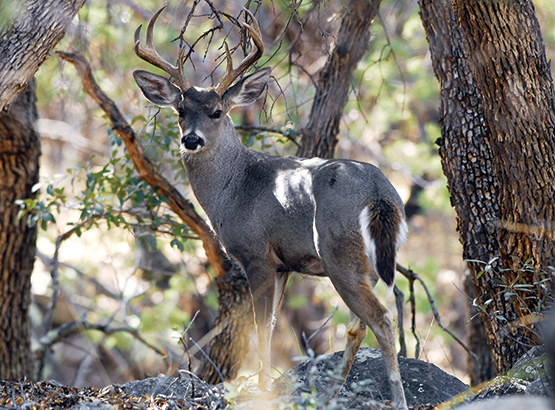White-tailed Deer
Arizona’s other deer, the Coues’, is a subspecies of the white-tailed deer. Coues’ deer are most common in Arizona’s southeastern mountains, but range up on to the Mogollon Rim and into the White Mountains. They are most abundant in areas of predictable summer precipitation.

About
In contrast to a mule deer‘s equally branching antlers, those of the white-tailed deer consist of a number of tines arising from a main beam which curves forward. Mature bucks generally have three to four tines per side. Coat color is grayish-brown salt-and-pepper with white underparts; the face is marked with white ‘halos’ around the eyes and a white band across the muzzle. The most distinguishing characteristic of the whitetail is its long, broad tail.
Hunt History
The Coues’ white-tailed deer is perhaps Arizona’s finest game animal. Wary, and expert at using cover, whitetails rarely offer the hunter a standing shot once jumped. Perhaps for this reason, the species has become increasingly important in the harvest. Although the statewide take has varied from 1,500 to more than 7,000 whitetails a year, depending on the vagaries of drought and fawn survival, the recent trend has been for this species to constitute an ever greater proportion of the statewide harvest. For example, whitetails comprised less than 15 percent of Arizona’s deer harvest in 1961 but today, they comprise over 40 percent of total deer harvested.
When seen at a distance, two distinguishing characteristics between the mule deer and the white-tailed deer, are evident in their tails and gait. The Coues’ has a flagging white tail and a more natural run. Mule deer on the other hand ‘run’ using a stiff legged, bounding gait.


Our Mission
To conserve Arizona’s diverse wildlife resources and manage for safe, compatible outdoor recreation opportunities for current and future generations.
Hunt Regulations
Rules and regulations for hunting in Arizona.
Regulations for spring hunts, fall hunts and pronghorn, elk hunts.
